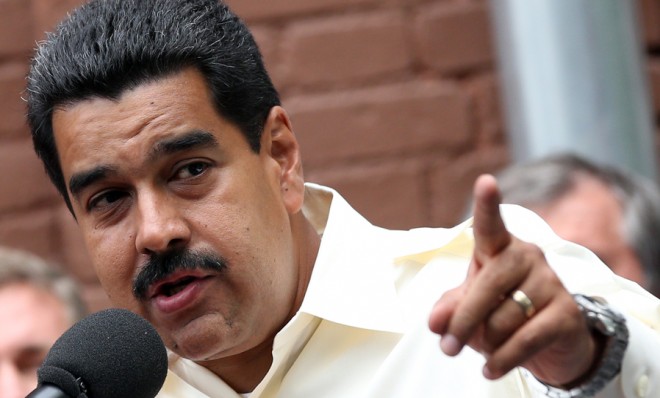Why Venezuela wants Edward Snowden
Giving Snowden asylum would shield him from espionage charges in the U.S. What would Venezuela get out of it?


A free daily email with the biggest news stories of the day – and the best features from TheWeek.com
You are now subscribed
Your newsletter sign-up was successful
A Russian lawmaker said Tuesday that NSA leaker Edward Snowden had accepted an offer of political asylum from Venezuelan President Nicolas Maduro. Neither the Venezuelan government nor Snowden immediately confirmed the claim — in fact, the lawmaker quickly deleted a tweet in which he announced it.
But if true, such an exile deal could be Snowden's ticket out of the Moscow airport, where he has been holed up for two weeks evading espionage charges in the U.S. The question is, what would be in it for Venezuela?
Snowden made himself an enemy of Washington by spilling secrets on the National Security Agency's mining of internet and phone-call data. That makes him a natural ally of Maduro, the hand-picked successor of the late anti-U.S. firebrand Hugo Chavez. And some of his allies in the region, including Bolivia, Nicaragua, and Cuba, have also expressed support for sheltering Snowden.
The Week
Escape your echo chamber. Get the facts behind the news, plus analysis from multiple perspectives.

Sign up for The Week's Free Newsletters
From our morning news briefing to a weekly Good News Newsletter, get the best of The Week delivered directly to your inbox.
From our morning news briefing to a weekly Good News Newsletter, get the best of The Week delivered directly to your inbox.
Taking in Snowden could also solidify Maduro's hold on power — a big plus given that roughly half the electorate thinks he stole the election from challenger Henrique Capriles in April. Juan Forero at The Washington Post notes that Maduro also faces "staggering economic problems at home despite the country's oil wealth."
Embracing Snowden could be a way for Maduro to simultaneously distract from Venezuela's domestic problems and beef up his anti-imperialist cred, silencing hardliners who have expressed fear that he would seek a rapprochement with Washington now that Chavez is gone. Here's Forero:
Political analysts say the opportunity to take sides against Washington was simply irresistible for a government that has for years characterized itself as a moral force speaking out for the weak against "the empire," as the United States is known in Caracas. And the fact that the secrets Snowden divulged were embarrassing to the Obama administration only gave more fuel to Venezuela. [Washington Post]
Maduro also might be reaching out to Chavez's old buddies overseas. Anastasia O'Grady says at The Wall Street Journal that "Venezuela has reason to fear increasing irrelevance as North America becomes more energy independent." Maduro might want to use the asylum offer to show Chavez allies such as Iran and Russia that he is just as "committed to the anti-American cause as was his predecessor," says O'Grady.
Reaching out to Mr. Snowden is a way to send a message to the world that notwithstanding Secretary of State John Kerry's feeble attempt at rapprochement with Caracas last month, post-Chavez Venezuela has no intention of changing the course of the Bolivarian revolution. Rather, as the economy of the once-wealthy oil nation deteriorates, Mr. Maduro is signaling that Venezuela wants to become an even more loyal geopolitical ally and strategic partner of Russia and Iran. [Wall Street Journal]
Some critics of Maduro's government also point out that his public stand against the surveillance techniques exposed by Snowden will serve as a smokescreen, obscuring the fact that his government is accused of even worse invasions of privacy. Adam Taylor at Business Insider says dissidents and journalists have repeatedly complained that the security apparatus set up by Chavez and continued by Maduro routinely uses illegal wiretaps to record their conversations — and then uses them for political gain. That is why, Taylor says, "to some in Venezuela who have put up with such intrusions into their privacy, the idea that Snowden might consider asylum in Venezuela is offensive."
A free daily email with the biggest news stories of the day – and the best features from TheWeek.com
Harold Maass is a contributing editor at The Week. He has been writing for The Week since the 2001 debut of the U.S. print edition and served as editor of TheWeek.com when it launched in 2008. Harold started his career as a newspaper reporter in South Florida and Haiti. He has previously worked for a variety of news outlets, including The Miami Herald, ABC News and Fox News, and for several years wrote a daily roundup of financial news for The Week and Yahoo Finance.
-
 The week’s best photos
The week’s best photosIn Pictures An explosive meal, a carnival of joy, and more
-
 The ‘ravenous’ demand for Cornish minerals
The ‘ravenous’ demand for Cornish mineralsUnder the Radar Growing need for critical minerals to power tech has intensified ‘appetite’ for lithium, which could be a ‘huge boon’ for local economy
-
 Why are election experts taking Trump’s midterm threats seriously?
Why are election experts taking Trump’s midterm threats seriously?IN THE SPOTLIGHT As the president muses about polling place deployments and a centralized electoral system aimed at one-party control, lawmakers are taking this administration at its word
